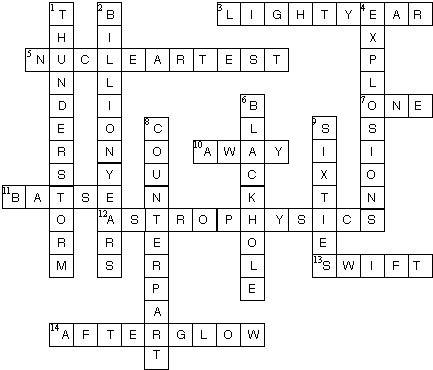Gamma-Ray Bursts - Answer Keys
TIMELY MATTER ANSWER KEY
These answers are true for the year 1999. Adjustments based on 8,760 hours for each ensuing year will need to be made for # 6-12.
- answers vary (ask students to show their work)
- 876,000 hours
- 114 years
- 1,072,656 hours (or 1,073,376 hours if leap years are included in calculation)
- 350,400,000 hours
- 1771
- 1,322,760 hours
- 1,909,680 hours
- 2,803,200 hours
- 19,307,040 hours (Neil Armstrong set foot on the moon in 1969)
- 35,040,000 hours (Columbus sailed for the "New World" in 1492)
- 24,317,760 hours (Jocelyn Bell Burnell discovered pulsars in 1968)
ELECTROMAGNETIC NOTATION ANSWER KEY
- 1 x 10-13
- 1 x 10-10
- 1 x 10-8
- 5 x 10-7
- 1 x 10-5
- 1 x 10-2
- 1 x 103
- 1,000,000,000,000,000,000,000
- 1,000,000,000,000,000,000
- 10,000,000,000,000,000
- 500,000,000,000,000
- 10,000,000,000,000
- 10,000,000,000
- 100,000
TELESCOPIC TRIVIA ANSWER KEY
- F
- I
- J
- B
- G
- E
- C
- H
- D
- A
FROM BILLIONS TO NONILLIONS ANSWER KEY
- 1 = G
- 2 = H
- 7 = T
- 9 = R
- 4 = E
- 3 = A
- 0 = L
- 5 = X
- 8 = Y
THE GREAT GALAXY
HIGH-ENERGY WORD SEARCH ANSWER KEY
|
K |
L |
E |
B |
E |
S |
A |
D |
E |
L |
S |
U |
N |
G |
||||||
|
L |
L |
I |
L |
||||||||||||||||
|
E |
A |
G |
A |
||||||||||||||||
|
C |
C |
H |
S |
||||||||||||||||
|
T |
K |
S |
W |
I |
F |
T |
T |
T |
|||||||||||
|
R |
H |
A |
|||||||||||||||||
|
O |
R |
O |
V |
||||||||||||||||
|
M |
A |
Y |
L |
O |
|||||||||||||||
|
B |
L |
A |
Z |
A |
R |
E |
G |
E |
N |
||||||||||
|
G |
Y |
R |
S |
R |
Y |
||||||||||||||
|
N |
T |
E |
E |
A |
|||||||||||||||
|
D |
E |
E |
P |
S |
P |
A |
C |
E |
H |
N |
P |
W |
|||||||
|
T |
L |
G |
E |
Y |
Y |
||||||||||||||
|
I |
B |
I |
H |
K |
|||||||||||||||
|
C |
B |
L |
G |
L |
|||||||||||||||
|
S |
P |
E |
C |
T |
R |
U |
M |
I |
|||||||||||
|
R |
A |
D |
I |
O |
H |
M |
H |
- light-year
- light
- Sun
- Klebesadel
- black holes
- Hubble
- electromagnetic spectrum
- GLAST
- Milky Way
- high energy
- hypernova
- radio
- deep space
- Swift
- blazar
COSMIC CODE MESSAGE
Gamma-rays are the most energetic form of light in the Universe! Gamma-ray bursts were first discovered by accident.
GAMMA-GRAMS ANSWER POSSIBILITIES
- glitch
- regency
- rust
- times
- parsec
- fist
- buns
- road
- weave
- mama
- awe
- birth
- arid
- met
- keys
START YOUR ENGINES! ANSWER KEY
(Teachers: As new information is discovered, the following answers may change.)
- A gamma-ray is a component of the electromagnetic spectrum. It is a high-energy form of light that falls outside of the range visible to the human eye. A gamma-ray has a very short wavelength but a very high frequency.
- A gamma-ray burst is the most energetic phenomenon that is currently occurring in the Universe. At least once a day, a tremendous, concentrated flash of gamma-rays comes from a source, usually in deep space.
- Gamma-ray burst theories currently being discussed are: merging neutron stars, merging black holes, and hypernovae.
- Example: 1.Gamma-ray bursts release as much energy in 10 seconds as the Sun does in 10 billion years. 2. The gamma-ray burst detected on January 23, 1999 had the energy of 10 million billion Suns.
- 7 (At least one per day)
- Ray Klebesadel and others at Los Alamos National Laboratory in New Mexico.
- 1967
- The first burst was detected by satellites monitoring compliance with the Nuclear Test Ban Treaty.
- 6 years
- Gamma-ray bursts are unpredictable. We do not know when they will occur or in what direction they will occur. The majority of them occur in deep space, at great distances from Earth.
- once every few million years
- Compton Gamma-Ray Observatory, Hubble Space Telescope, BeppoSAX (a European Satellite)
- satellites (Compton Gamma-ray Observatory, BeppoSAX, Hubble Space Telescope), the Internet, a ground-based robotic telescope
- Swift can be positioned toward a burst within 50 seconds of it first being detected.
- Gamma-Ray Large Area Space Telescope, 2005
INSTRUMENTAL MATCHES ANSWER KEY
GAMMA-RAY WORDS ANSWER KEY





